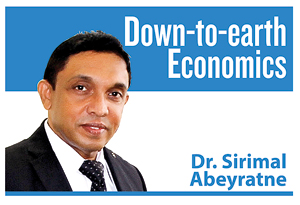Rise and fall of import substitution in a International context
View(s):
Tea tasting. Tea exports is a good example of how Sri Lanka has benefitted.
In a recent webinar discussion, I was listening to an argument between an economist and a businessman. The economist said, “Exports’ expansion will be discouraged by import protection”. Obviously, it was a confusing statement to many and, exactly that was the point raised by the businessman: “We are talking about import protection, not export expansion; import protection is needed to protect our domestic industries”.
I must say at the outset that both statements are correct, but only within their own premises! If they try to enter each other’s domain justifying these statements, no matter how profound the arguments are, they are both wrong! I know, it is now even more confusing, so I thought of raising this issue to clear any doubts.
Terrible misconceptions
There is a terrible misconception out there that “when somebody knows economics, he can do business better”. Neither have I met many economists who have become businessmen. Even the great English economist who wrote the first macroeconomic book “The General Theory of Employment, Interest and Money” (1936) and who gave birth to the so-called Keynesian economic tradition, was said to have lost his investment in the stock exchange! However, it doesn’t lead to any conclusion either. There are those economists and businessmen both who could avoid losses from the US Financial Crisis in 2008 by following economic booms
and busts.
In his statement mentioned above, the economist was referring to the “economy-wide” outcome of import protection based on established economic principles, which have been studied and tested for 100s of years now.
The businessman, on the other hand, was referring to a business activity – perhaps, to his own business. There are businessmen everywhere in the world who have found a fortune with their business when the competition is blocked by import controls. No need to mention that nowadays such businesses are many. Because of the prevailing import controls, they could sell at a high price exploiting the customers who lost the choices in the open market; of course, it is a welcome move from a business point of view for some businesses.
It is a terrible mistake, however, as the businessman argued above, if he thinks that his individual fortune can be multiplied and expanded to a national level. This mistake is called in economics, “a fallacy of composition” – what is right for a part is right for the whole! The problem can be translated into a “crisis” when businessmen with their “fallacy of composition” in mind get together and think of formulating development policies for a country!
 Why doesn’t such a business strategy work for a country? That is exactly what the statement of the economist meant: “Exports expansion will be discouraged by import protection”. There are a couple of questions that would arise from this statement: The first is the connection between the two – import protection and export expansion, which appear to be mutually exclusive. The second is that even if the two are connected, so what is the problem?
Why doesn’t such a business strategy work for a country? That is exactly what the statement of the economist meant: “Exports expansion will be discouraged by import protection”. There are a couple of questions that would arise from this statement: The first is the connection between the two – import protection and export expansion, which appear to be mutually exclusive. The second is that even if the two are connected, so what is the problem?
Passion and the fashion
When the Second World War was concluded, it was in the 1940s that “import substitution” policies became the passion and the fashion in “under-developed” countries. The intellectual backing was provided by several political economic ideologies such as the Structuralists, the Dependency theorists, and the Neo-Marxists. They advocated for under-developed countries to de-link their trade ties with the western industrialised countries and to become “import-substituting” economies. This meant that the under-developed countries should cut down their “imports” from the western industrialised countries – the US and Europe – and start producing “import substitutes” by themselves and for themselves!
According to all these economic ideologies, the existing trade patterns between the western industrialised countries and the poor under-developed countries were the “mechanism” established by the former in order to exploit the latter – just like the “bourgeoisie” exploits the “proletariat” in Marxist terminology; the former is the capitalist class, while the latter is the working class. This means that the western countries played the role of “bourgeoisie” exploiting the latter which played the role of “proletariat”.
We shouldn’t forget that this was also the time that the world had been caught up in the Cold War – the competition between the US-led capitalist bloc and the USSR-led socialist bloc in order to gain dominance over the world. It was also the time that the colonised under-developed countries started gaining their political independence from the western colonisers. And they were the battleground for the Cold War.
All the prevalent “anti-western” and “pro-nationalist” sentiments in newly-independent states were supportive of the new development strategy – import substitution policy, which was aimed at de-linking from the West. Here comes also a new “angel” to support them – the USSR, which was considered a successful case of “import substitution” at the time. Much more than that, it could stand shoulder-to-shoulder with the US and fight the world’s capitalist enemy.
Disastrous end
Import substitution through import controls, first started in Latin American countries with the full support of the Economic Commission for Latin America (ECLA); then it spread to Africa and Asia – almost throughout the entire under-developed world. Import controls were adopted with high tariffs, non-tariff barriers, and foreign exchange restrictions. From the 1950s to 1980s they attempted to replicate the prosperity of the western industrialised world through an import substitution route based on a different set of economic principles.
Towards the end of the road, it was a dead-end; they found that their economies slowed down and unemployment worsened; they did not succeed in reducing their import bill but, instead found that their foreign exchange shortage had worsened. By taking that route, in fact, they all appeared to have lost about a quarter of a Century.
At the same time, there were four countries in East Asia which did not subscribe to the import substitution policy – South Korea, Singapore, Taiwan and Hong Kong. Instead of import substitution, these countries pressed forward with export promotion. They succeeded in achieving faster growth, higher per capita income and job creation, while overcoming the problem of a foreign exchange shortage. Of course, by learning from them, almost all the developing countries then started policy reforms towards export promotion.
Why did the few export-oriented countries succeed while all the import-substituting countries everywhere in Latin America, Africa and Asia fail? The issue has been well-documented, leaving no room for any doubt, both theoretically and empirically. These economic studies are immense; some of them analysed the issue as to “why did import-substituting countries fail”, while some others focused on the issue “why did the export-oriented countries prosper”. This is where you find the answer to solve the confusion that I raised at the beginning.
Anti-export bias
If a country adopts a set of import controls and provide protection to selected businesses, they will have the monopoly power in the protected local market to exploit their customers and prosper. Some would justify it saying that “one day in the future” they will become global business tycoons!
But if you adopt it as a “national policy” to protect domestic industries with import controls that is exactly what the under-developed countries did under the import substitution policy and failed miserably. The main reason is that the domestic market is “too small” for any country. Whether it is Singapore with 5 million people or China with over 1 billion people and, Sri Lanka with 20 million people or India with over 1 billion people, they all are too small for each one of them!
By definition, import substitution means to adopt policies to make domestic markets more profitable than export markets artificially. In effect, it results in a re-allocation of resources towards production for the domestic market, creating the so-called policy bias against exports. While the domestic market is too small to grow, export growth will slow down. This means that the countries which adopt import controls are bound to get more entangled in a foreign exchange crisis. Theoretically, import controls are no different from export taxes!
(The writer is a Professor of Economics at the University of Colombo and can be reached at sirimal@econ.cmb.ac.lk and follow on Twitter @SirimalAshoka).


